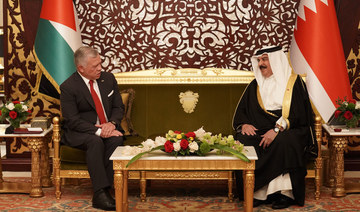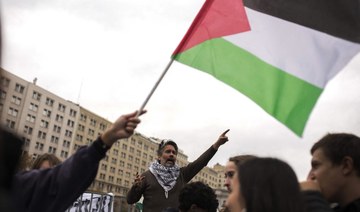WASHINGTON: The global economy is likely slowing sharply this year, hobbled by high interest rates, the repercussions of Russia’s invasion of Ukraine and the lingering effects of the coronavirus pandemic.
That’s the latest outlook of the World Bank, a 189-country anti-poverty agency, which estimates that the international economy will expand just 2.1 percent in 2023 after growing 3.1 percent in 2022.
Speaking to reporters Tuesday, Indermit Gill, the World Bank’s chief economist, called the latest findings “another gloomy report.” The bank, he said, expects “last year’s sharp and synchronized slowdown to continue to this year into a sharp slowdown.”
“By the end of next year, a third of the developing world will not meet the per-capita income level that they had at the end of 2019,” he said.
Still, the bank’s latest Global Economic Prospects report marks an upgrade from its previous forecast in January. That estimate had envisioned worldwide growth of just 1.7 percent this year.
The Federal Reserve and other major central banks have been aggressively raising interest rates to combat a resurgence of inflation, set off by a stronger-than-expected rebound from the pandemic recession, persistent supply shortages and energy and food price shocks caused by the Ukraine war.
But the global economy has proved surprisingly resilient in the face of higher borrowing costs, and the World Bank predicts that growth will accelerate to 2.4 percent in 2024.
The United States has continued to generate unexpectedly robust job gains — employers added 339,000 workers in May, far more than economists had forecast — even though the Fed has raised its benchmark rate 10 times in the past 15 months. In its report Tuesday, the World Bank upgraded its forecast for US economic growth this year to 1.1 percent. Though weak, that is more than double the growth the World Bank had envisioned in January.
The eurozone, which represents the 20 countries that share the euro currency, is expected to post collective growth of 0.4 percent this year. That, too, marks a slight upgrade: In January, the World Bank had expected no growth at all for the eurozone this year. Europe, struggling with higher energy prices caused by the Ukraine war, enjoyed relief from a surprisingly warm winter, which reduced demand for heat.
The World Bank upgraded its 2023 outlook for China after Beijing late last year relaxed its draconian zero-COVID policies, which had restricted travel and hammered its economy. The world’s second-biggest economy is now expected to grow 5.6 percent in 2023, up from 3 percent last year. The World Bank envisions Japan’s growth decelerating to 0.8 percent this year from 1 percent in 2022. It foresees India’s growth slowing to a still-strong 6.3 percent from 7.2 percent last year.
The bank predicts that global trade will slow markedly this year. It foresees a sharp drop in the price of energy and other commodities this year and next.
World Bank offers dim outlook for the global economy in face of higher interest rates
https://arab.news/rfbyt
World Bank offers dim outlook for the global economy in face of higher interest rates

S&P reaffirms Bahrain’s credit rating amid fiscal challenges; outlook stable
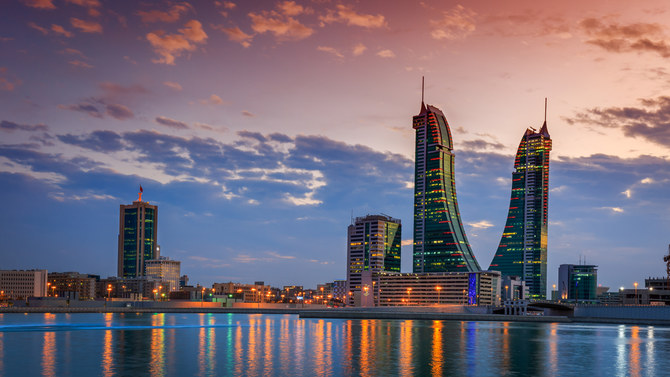
RIYADH: Bahrain’s commitment to fiscal consolidation has witnessed S&P Global Ratings reaffirm its “B+/B” credit standing with a stable outlook despite challenges in 2023.
However, the agency added that the transfer and convertibility assessment on the Gulf state remains “BB-.” It also anticipated structural reforms aimed at strengthening the non-oil revenue base, albeit at a slower pace.
In its report, S&P said that the stable outlook reflects the expectation that Bahrain will persist in implementing measures to reduce its budget deficit, possibly benefiting from additional support from other Gulf Cooperation Council sovereigns if necessary.
Conversely, the ratings could improve if Bahrain’s fiscal situation exceeds expectations, leading to a reduction in net debt relative to gross domestic product, or if current account surpluses widen, bolstering the country’s external position, according to the study.
However, potential downside risks include a significant increase in government debt or a sharp decline in foreign currency reserves, which could hinder debt servicing and monetary policy effectiveness.
“We could lower the ratings if the government’s net debt and debt-servicing burden increased significantly beyond our assumptions, presenting funding challenges. We could also take a negative rating action if foreign currency reserves declined sharply, limiting the government’s ability to service its external debt and weighing on monetary policy effectiveness,” the report said.
On the other hand, the rating agency outlined an optimistic scenario for Bahrain, stating that it might upgrade the country’s standing if the government surpasses expectations by substantially reducing net debt relative to GDP through improved budgetary performance.
Additionally, the ratings could increase if the current account surpluses are expanded significantly and consistently enhance the island state’s external position.
The agency noted that its assessment is based on the anticipation that the Bahraini government will fortify its financial stance up to 2027, notwithstanding the considerable deficit expansion in 2023.
It added that the shortfall experienced last year was primarily influenced by elevated interest rates, a one-off lump sum social support program, and an upward adjustment in pensioners’ inflationary allowance that will continue into 2024.
Considering this initial setback, S&P foresees broader fiscal deficits averaging 4.4 percent of GDP from 2024 to 2027, compared to 3.8 percent in its prior evaluation.
“A decline in oil production due to ongoing maintenance at the Abu Safa oil field also affects our revenue assumptions. However, we believe the government will continue pursuing fiscal and structural reforms to strengthen its non-oil revenue base, allowing for continued, albeit slower, fiscal consolidation over our forecast horizon to 2027,” the agency said in its report.
Moreover, S&P assumed that Bahrain would receive the remaining $2.8 billion of the $10.2 billion GCC support package pledged by Saudi Arabia, the UAE, and Kuwait in 2018, and there remains potential for additional financial support beyond the program’s expiration at year-end 2024 if needed.
“These interest-free loans have historically covered about 50 percent of the government’s gross external financing needs, although we note disbursements are not tied to, and do not necessarily align with, Bahrain’s external debt repayments,” the agency said.
It further highlighted that Bahrain encounters annual external debt redemptions ranging from $2.0 billion to $2.5 billion, equivalent to 5 percent of GDP, stemming from a mix of Eurobond and sukuk issuances.
In February, S&P explained that Bahrain successfully raised $2 billion by issuing a seven-year, $1 billion sukuk at 6.0 percent and a 12-year, $1 billion conventional bond at 7.5 percent.
“We understand the issuance was met by strong investor demand, supporting more favorable pricing dynamics. In our base-case, we assume Bahrain will maintain strong access to international capital market funding,” it added.
It explained that the country’s relatively diverse economy, proximity to Saudi Arabia’s market, robust financial sector oversight, and educated workforce provide a foundation for resilience. However, stagnant GDP per capita levels, adjusted for population growth, suggest underlying challenges in achieving broad-based economic prosperity.
“However, when GDP performance from 2017-2027 is adjusted for population levels, GDP per capita levels are largely flat, suggesting that labor supply, rather than productivity, remains the key growth spur. We view Bahrain as having a relatively wealthy economy and estimate GDP per capita at $27,58 in 2024,” it said.
Saudi drilling firm ADES secures 6 onshore contracts at $645.3m in Kuwait
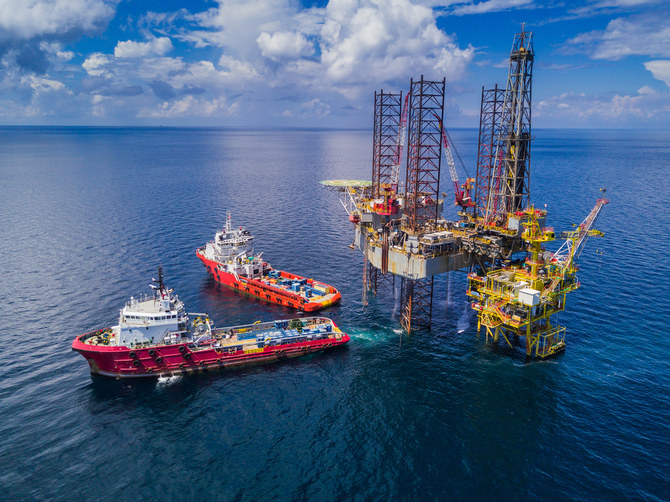
RIYADH: Saudi exploration service provider ADES Holding Co. has secured a SR2.42 billion ($645.3 million) deal for six onshore drilling contracts with Kuwait Oil Co., marking an expansion of its operations.
ADES specified that the award includes new agreements for four existing operating rigs in Kuwait and two newly constructed units, according to a release to Tadawul.
The contracts are slated to commence in the second and third quarters of 2025, with a firm five-year duration and an optional one-year extension.
Saudi Arabia to propel global sustainable development through AI, says finance minister
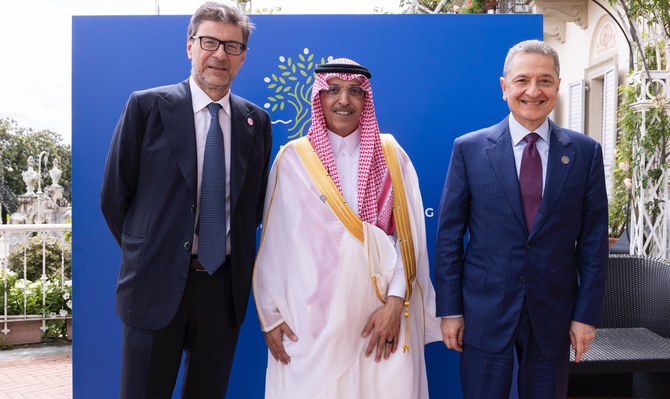
RIYADH: Saudi Arabia is on track to help propel sustainable development globally through its pivotal role in artificial intelligence, according to the Kingdom’s finance minister.
In a session titled “AI and Development: Challenges and Opportunities” at the third meeting of G7 finance ministers and central bank governors under the Italian presidency, held last week in Stresa, Italy, Mohammed Al-Jadaan explained that the Kingdom is committed to advancing technology, particularly AI, to foster inclusive growth, according to a statement.
This aligns with Saudi Arabia’s National Strategy for Data and AI, which aims to establish the Kingdom as a global tech leader by 2030.
Additionally, the minister participated in a session titled “Addressing Financing Needs of Vulnerable Countries,” where he stressed the potential of a proposed multidimensional approach to dealing with debt vulnerabilities.
He underscored that this strategy aims to create fiscal space, improve resilience, and progress toward the Sustainable Development Goals.
Fitch upgrades Saudi Electricity Co. to ‘A+’ citing strong govt support
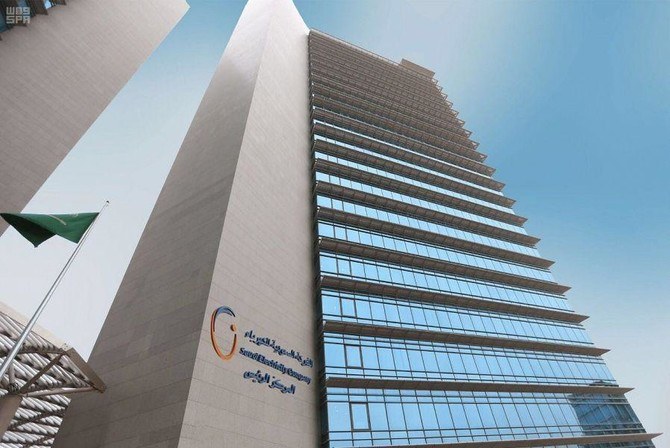
RIYADH: Saudi Electricity Co. received an upgrade from Fitch Ratings, raising its long-term foreign and local currency issuer default rating to “A+” from “A,” citing government support.
In its latest report, the agency also upgraded the company’s national long-term rating to “AAA” from “AA,” with a stable outlook.
According to Fitch, SEC’s standalone credit profile remains at “bbb” due to its dominant position in Saudi Arabia’s electricity market.
“The upgrade follows our reassessment of SEC’s links with the Saudi Arabian government under Fitch’s recently updated Government-Related Entities Rating Criteria. SEC’s ratings are now equalized with those of Saudi Arabia (A+/Stable),” stated Fitch in the report.
According to the US-based agency, an “A+” rating denotes expectations of low default risk and a strong capacity to meet financial commitments.
On the other hand, a “bbb” rating indicates that while default risk expectations are currently low and the capacity to meet financial commitments is adequate, adverse business or economic conditions could impair this capacity.
Commenting on the upgrade, Khaled bin Hamad Al-Gnoon, CEO of SEC, said the rating action is a testament to the company’s efforts and investments to bolster the reliability and efficiency of Saudi Arabia’s electrical grid.
“This improved rating is reflective of our best-in-class governance, our close alignment with the Ministry of Energy and Saudi Arabia’s decarbonization strategy, and our solid financial profile,” said Al-Gnoon.
He added: “We are committed to maintaining our service excellence and fulfilling our pivotal role in powering Saudi Arabia’s future.”
In a statement, the company said the upgrade was driven by several key factors, including recognition of SEC’s robust decision-making and strong government support.
Additionally, the upgrade acknowledges SEC’s stable financial profile, bolstered by the conversion of SR168 billion ($44.80 billion) of liabilities into equity-like instruments, the company’s leverage headroom, and strong cash flow visibility.
Earlier this month, SEC reported a net profit of SR897 million for the first quarter of 2024, marking an 87 percent increase compared to the same period the previous year.
Saudi’s ACWA Power signs several MoUs with Japanese companies
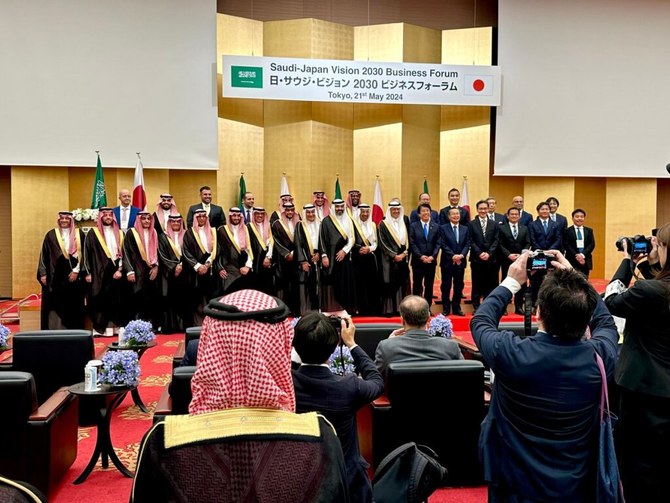
Saudi Arabia’s ACWA Power signed memorandums of understanding with several Japanese companies on the sidelines of the Saudi-Japan Vision 2030 Business Forum that took place on May 21.
ACWA Power signed agreements with Sumitomo Mitsui Banking Corporation, Mizuho Bank, SBI Holdings and Toray Membrane Middle East to encourage collaboration on sustainable energy and water solutions.
According to ACWA Power, the objectives of the MoUs are to promote sustainable energy transition and attracting foreign investment.
The MoUs are important to the Kingdom in terms of water desalination supplies, reducing carbon emissions and economic development.
The Saudi Arabia-Japan Vision 2030 Business Forum took place in Tokyo last week with over 300 industry officials and leaders discussing ways to boost trade, investment and cultural ties.
Saudi Arabia’s Minister of Investment Khalid Al-Falih, Minister of Energy Prince Abdulaziz bin Salman Al Saud and Japan’s Minister of Economy, Trade and Industry SAITO Ken attended the forum, each giving a speech commemorating the relationship between the two nations.
Saito said the Japanese government will extend its maximum support to expand business with Saudi Arabia, while Prince Abdulaziz said the Kingdom “will bring collaborations to the forefront and will make sure that in all of the forums, we advocate the same aspirations in the national transition process attending to energy requirements.”
Al-Falih said in his closing remarks that the Kingdom’s non-oil income has “doubled and is looking for an accumulated investment of over $3 trillion that offers big chances to Japanese.”
He added that Saudi Arabia has a “bubble of projects as it will host Expo 2030 in Riyadh.”
Saudi Arabia will also host the Winter Olympics in NEOM, and the World Cup 2034, that offers investment chances for the Japanese companies to participate, he explained.
Sessions at the forum included “Forging stronger manufacturing collaboration between KSA and Japan,” “Collaboration in the new era of sustainability and circular economy,” “Reinventing entertainment and gaming industries across borders,” and “Expanding the area of cooperation in healthcare.”
Additionally, the forum hosted a “Digital Entertainment Roundtable,” to discuss Saudi Arabia’s efforts to build a local gaming industry, which includes localizing Japanese games for the Saudi market, collaborating with esports tournament organizers, and investing in the digital entertainment sector.




